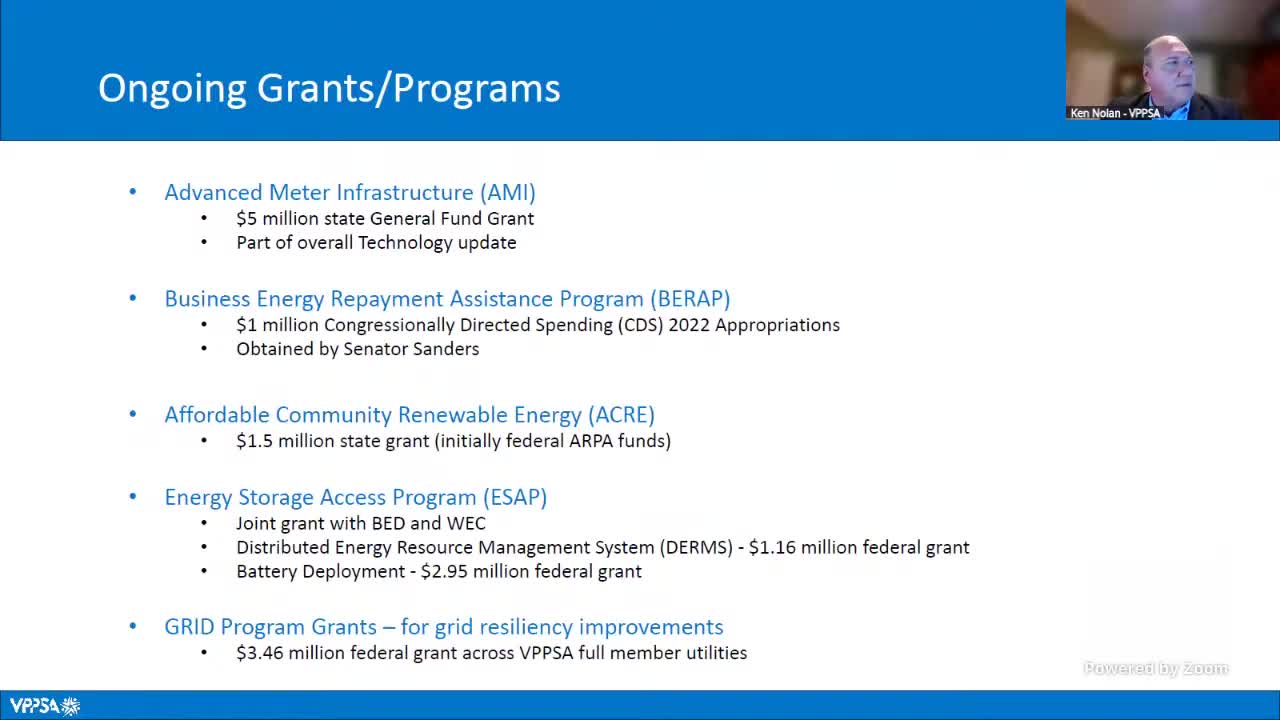Vermont utilities warn frozen federal grants, administrative shifts and FEMA delays are slowing projects and raising costs
Get AI-powered insights, summaries, and transcripts
Subscribe
Summary
Municipal and cooperative utilities and VEPSA told the House committee that recent federal administrative changes, paused grants and slow FEMA reimbursements are delaying metering, resiliency and storage projects and could require utilities to accelerate or restructure planned work to avoid losing federal funds.
Representatives from Vermont's municipal utilities, joint action agencies and cooperatives told the House Energy and Digital Infrastructure Committee that federal grant pauses, shifting Department of Energy guidance and multi-year FEMA reimbursement timelines are creating operational and financial risk for local projects.
Ken Nolan, general manager of the Vermont Public Power Supply Authority (VEPSA), said congressionally directed spending that was negotiated with the Department of Energy has become difficult to deploy. "The administrative requirements made it almost impossible," he said of a planned revolving loan fund; VEPSA is working to convert a loan model into a one-time grant to avoid ongoing federal reporting burdens. Nolan also said officials advising VEPSA were told to avoid certain technologies under current DOE guidance: "We're being told to avoid any technologies that the new administration opposes, in particular, solar, EV chargers, and batteries." VEPSA described several federal awards: an AMI (advanced metering infrastructure) allocation from the state ($5,000,000 to VEPSA for smaller utilities), energy storage access grants, a DERMS study grant and grid resiliency grants totaling roughly $3.5 million across 11 full members.
Lewis Porter, general manager of Washington Electric Co-op, said the co-op is highly dependent on federal low-interest loans and FEMA reimbursements. "We are very dependent on federal . . . help with federal partners, especially in the rural utility service, in order to serve our members at reasonable rates," Porter told the committee, noting the co-op recently closed an $11,000,000 low-interest loan and expects a $2.5 million metering grant. Porter and other witnesses said FEMA reimbursements typically took 12-18 months in the past and are now stretching to two years or more; some utilities are carrying bridge loans while awaiting FEMA reimbursement.
Darren Springer, general manager at Burlington Electric, described a roughly $5 million federal EV-charging grant that was approved but has remained frozen at the federal level since January. "It was sitting on the desk in Washington DC in January, and it has been frozen ever since," Springer said. Burlington had planned to match federal funds with a voter-approved net-zero energy revenue bond to build up to 200 public chargers; the freeze has forced the utility to scale its plans and fund additional work through local revenue bonds.
Multiple witnesses warned of so-called "clawback" risk: municipalities that accelerate work assuming a federal match may find grants rescinded mid-project, leaving ratepayers or local governments to cover unexpected costs. The net effect, witnesses said, is that utilities are accelerating projects already planned in order to spend funds while they remain available, and they are seeking more flexible state-level tools to replace federal funding that has become uncertain.
What's next: Utilities asked the Legislature to continue monitoring grant timelines and administrative changes at DOE and FEMA and to consider state policy flexibility that would let municipal or public utilities use local funds to maintain project timelines if federal money becomes unavailable.
